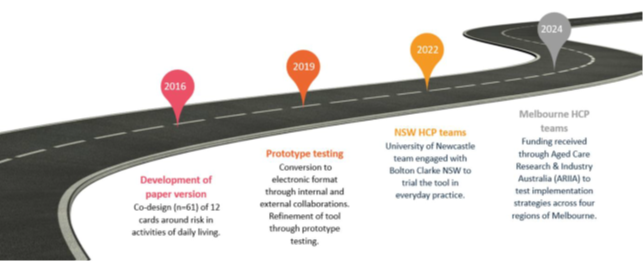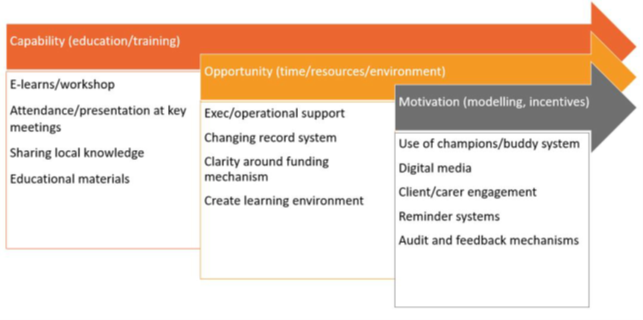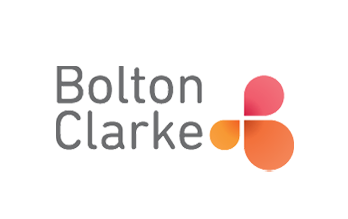Project description
Royal District Nursing Service Limited trading as Bolton Clarke in partnership with Flinders University has been awarded an ARIIA grant for their project ‘Enabling Choices’: a risk negotiation tool for frontline staff to collaborate with people living with dementia’.
The ‘Enabling Choices’ conversation tool is fit-for-purpose and is designed to balance a person with dementia’s choices around activities of daily living (ADLs) that are becoming a bit risky. Pilot work identified feasibility and acceptability of the co-designed tool for people with dementia, their carers and frontline community aged care workers. Uptake of tools into practice, however, is challenging, with valuable research potentially lost through inadequate planning for implementation.
This project takes the pilot work to the next level of implementation, focusing on the careful and comprehensive planning and outcome evaluation that is necessary for upscale across Bolton Clarke, Australia’s largest independent aged and community care provider.
The primary emphasis of this work is on evaluation of implementation outcomes, comparing various form and function of implementation strategies across four regions of Bolton Clarke At Home Support services. Person-level outcomes for staff, people with dementia and carers are collected as secondary measures.
Project outcomes
Background and Aims
Living with cognitive impairment and/or dementia can mean having to face risks in daily life. These risks can be difficult to talk about. The Enabling Choices tool aims to help have conversations about day-to-day activities and ways to manage risks in these activities, a shared conversation, if possible, between the person with cognitive impairment, their informal carer, and community aged care staff.
The development of Enabling Choices through to implementation into routine practice has been an enduring journey with Bolton Clarke’s Home Care Package (HCP) teams and the dementia clinical nurse consultants (Figure 1).

Figure 1: Development of Enabling Choices
This project, funded through Aged Care Research & Industry Australia (ARIIA), aimed to utilise implementation science principles to embed the Enabling Choices tool into community aged care practice, comparing the impact of various strategies to support behaviour change, and build knowledge, skills, and confidence among staff members through training and support resources.
What we did
The first objective was to assess current contextual challenges and opportunities, and design implementation strategies. The team identified challenges with raising awareness of the tool, and the need for prompts or triggers to use it, while also understanding the workflow requirements of when and how to use it. Implementation strategies were identified and aligned to the COM-B behaviour change model1 (Figure 2).

1 Michie S, van Stralen M, West R. The behaviour change wheel: A new method for characterising and designing behaviour change interventions. Implementation Science. 2011;6(42).
Figure 2: Implementation strategies aligned with COM-B behaviour change model
Training for Enabling Choices was developed using instructional design principles and delivered to 67 Home Care Package staff across the four regions of Melbourne. Teams in the East and South regions received implementation support, while teams in the West and North did not. There was little change, according to questionnaire data, in their confidence and job satisfaction levels because of the training and use of the tool over a 4-month period.
Outcomes
Seventeen staff members agreed to be interviewed at the conclusion of the intervention period. Thematic analysis was undertaken with findings outlined across four themes.
- Augmenting care with a conversation tool
Enabling Choices was generally considered user-friendly and beneficial in the care planning process, for both staff members and older people living with dementia. The tool was designed to structure, and keep records of, conversations, which may be beneficial, but also potentially repetitious. - Training with a flexible and supportive approach
Preliminary training and subsequent support for consolidation of learnings needed further refinement. Learned skills needed to be used immediately, and the recording of the training needed a greater focus on case studies and real-life scenarios, and an opportunity to practice. Ongoing support and reminders in various forms (e.g., Microsoft Teams chat, champions, team meetings) were welcomed. - Clearly articulating the target audience
The value proposition of Enabling Choices for the target audience lacked clarity. There was potential for Enabling Choices with new clients, at initial assessment, in the earlier stages of dementia, and at a time of change in circumstances or condition of the person with dementia. For difficult conversations around activities of daily living, there were benefits in shared conversations and role clarity between staff members, the person with dementia and their informal carer. - Overcoming hesitancy to embrace the tool, incorporating back-end systems change
Hesitancy to embrace the tool was related to a lack of confidence, as well as frustrations at a local systems level, with burdensome workflow processes and back-end issues. Enabling Choices was deemed a valuable resource for less experienced staff caring for a person with dementia.
Impact on aged care and workforce
Three people with memory loss and two informal carers used the tool with the researcher on one occasion, to understand the useability of the tool. From their perspective, the tool was found to be helpful and logical, useful for forward planning and discussing topics that may not be ‘front of mind’. Their perspectives were particularly constructive in amending the updated training case studies and real-life scenarios.
Enabling Choices has great potential for upscale to other community aged care providers. Enabling Choices is a key piece of work to assist aged care providers meet the current Aged Care Quality Standards and the new incoming strengthened Standard no. 1 – The Person - reflecting concepts of dignity and respect, independence, and choice and control.
Next steps
At present, the tool is only available on the Bolton Clarke platform. It is currently being embedded within the dementia care plan, ensuring consistency in safe and quality care and service provision, and an organisation-wide, evidence informed approach to assessment, care planning and service provision for people living with cognitive impairment and/or dementia. We are interested in seeking additional funding and collaborations to explore its scalability to other providers.

